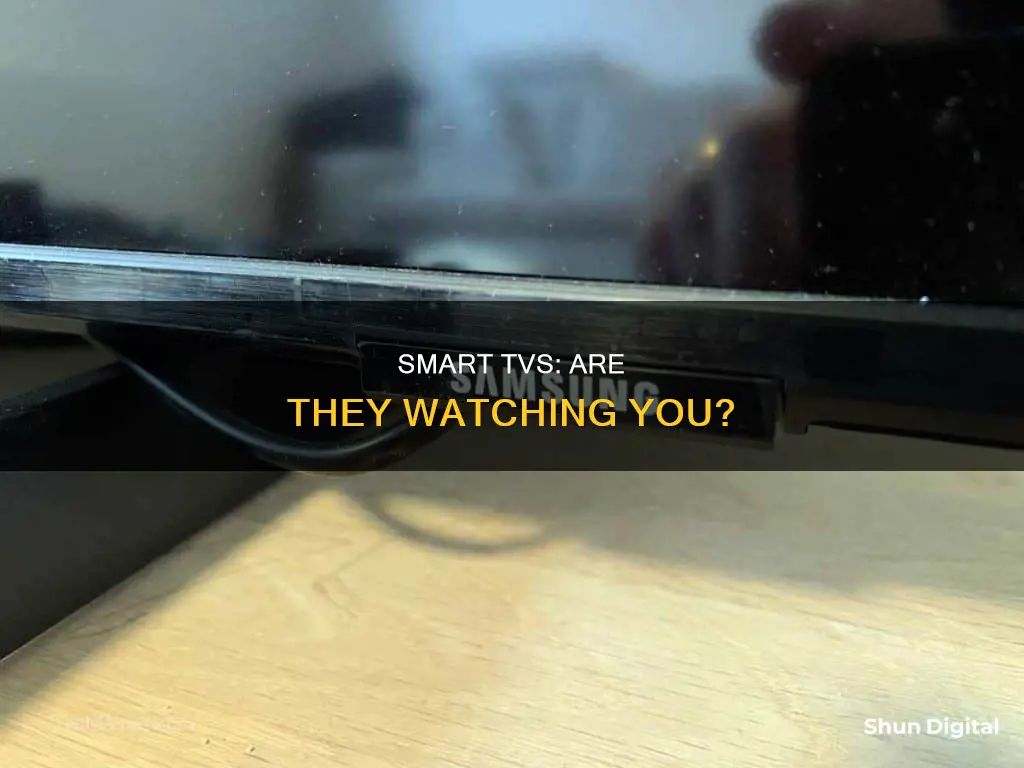
Smart TVs are becoming increasingly popular due to their internet connectivity and built-in features such as cameras and microphones. However, this very connectivity poses a potential risk to users' privacy and security. While most TVs don't have cameras, some Samsung models do, and these cameras can be used to spy on users. Smart TVs collect data on users' viewing habits and personal information, which is then sold to advertisers. This data collection is often done without users' explicit consent and can lead to targeted advertising and other privacy invasions. Additionally, smart TVs can be hacked, providing a gateway for malicious actors to access users' home networks and spy on them through the TV's camera and microphone. To protect their privacy, users should disable data collection features, change default security settings, and be cautious about the manufacturers' data practices.
| Characteristics | Values |
|---|---|
| Do smart TVs have cameras? | Yes, some smart TVs have built-in cameras, but it depends on the model of the TV. |
| Do smart TVs watch you? | Yes, smart TVs collect data about what you watch. They may also have cameras and microphones to help with data collection. |
| How do smart TVs watch you? | Smart TVs use automatic content recognition (ACR) to gather data about your viewing habits. |
| Why do smart TVs watch you? | Smart TVs collect data to provide targeted advertising and to improve your viewing experience. |
| How can you stop smart TVs from watching you? | You can disable ACR, block built-in cameras, and turn off built-in microphones. |
What You'll Learn
- Smart TVs collect data by watching what you watch, including your cable, satellite, streaming, online TV, and even video game preferences
- The data is then sold to advertisers and data brokers
- Cybercriminals can use your Wi-Fi network to hack your smart TV, gain access to your smart home, or even threaten you with ransomware
- Smart TVs can be hacked and used as spying devices
- Some smart TVs have built-in cameras, but it depends on the model of the TV

Smart TVs collect data by watching what you watch, including your cable, satellite, streaming, online TV, and even video game preferences
In addition to ACR, smart TVs may also have built-in cameras and microphones that can be used for spying. While cameras are usually only included on higher-end models, microphones are common on most smart TVs. These microphones are used for voice commands and can be disabled in the settings.
It is important to note that disabling ACR and other data collection features may limit the functionality of your smart TV. For example, disabling ACR may result in fewer targeted ads and content recommendations.
To protect your privacy, it is recommended to review the privacy settings and user agreements of your smart TV. You can also use a virtual private network (VPN) to encrypt your internet traffic and prevent third parties from intercepting your data.
Can Principals Monitor Teachers Through Surveillance Cameras?
You may want to see also

The data is then sold to advertisers and data brokers
Smart TVs are often sold at low prices or near cost because manufacturers can monetise them through data collection, advertising, and direct-to-consumer entertainment. This is known as "post-purchase monetisation".
Manufacturers collect data about what you watch, how long you watch it, and what you search for. This data is then packaged with your IP address, demographic data, and other information, and sold to third parties. This can include marketing and data firms, who can use the data to create a detailed picture of your habits and behaviours.
While your name is not connected to your data, your IP address is. This means that, based on what you watch on TV, you may see more targeted ads when you browse the internet or use social media.
Some of the biggest smart TV brands have been caught acting unethically when it comes to data collection. In 2016, it was revealed that Samsung was sending unencrypted user-specific voice commands to third parties for processing. Vizio was also caught collecting and selling data without asking users for permission in 2017, and was fined by the Federal Trade Commission.
Are You Being Watched? Detect Hidden Cameras
You may want to see also

Cybercriminals can use your Wi-Fi network to hack your smart TV, gain access to your smart home, or even threaten you with ransomware
Smart TVs are a great addition to our homes, offering a wide range of features and functionalities. However, it's important to be aware of the potential risks associated with these devices, especially regarding our privacy and security. One such risk is the possibility of cybercriminals exploiting our Wi-Fi networks to gain unauthorized access to our smart TVs and, consequently, our smart homes.
Cybercriminals are constantly devising new ways to compromise our digital security, and smart TVs have emerged as a tempting target due to their increasing popularity and the sensitive data they collect. By gaining access to our Wi-Fi networks, malicious actors can exploit vulnerabilities in these devices or the network itself to compromise our privacy and even hold our data for ransom.
- Network infiltration — Cybercriminals can set up fake Wi-Fi networks or exploit vulnerabilities in public Wi-Fi networks, a tactic known as "evil twin" attacks. When you connect to these networks, they can intercept your data, including login credentials and personal information, leading to identity theft and other malicious activities. To protect yourself, always use secure networks that you trust, and consider using a VPN (Virtual Private Network) to encrypt your data.
- Direct hacking — In some cases, cybercriminals may specifically target smart TVs to gain access to your home network. Smart TVs often collect personal data, such as viewing habits and even facial recognition data, which can be valuable to malicious actors. Ensure your TV's software is up to date, and disable any features you don't need, like cameras and microphones, when not in use.
- Ransomware attacks — Once cybercriminals gain access to your smart TV or network, they may install ransomware, locking you out of your own data and demanding payment for its release. To protect against this, regularly back up your important data and ensure your devices are running up-to-date security software with strong passwords.
- Data exploitation — The data collected by smart TVs, such as viewing habits and personal information, is valuable to advertisers. However, cybercriminals can also exploit this data for their gain. They can use it to create highly targeted ads or even sell it on the dark web. Be cautious about the data you share, and review the privacy policies of your smart TV and streaming services to understand how your data is being used.
- IoT vulnerabilities — Smart TVs are often connected to the same Wi-Fi network as other smart devices in your home, creating a potential pathway for cybercriminals to access multiple devices. Ensure all your smart devices are secured with strong passwords and regularly updated software to reduce the risk of unauthorized access.
While smart TVs offer many conveniences and entertainment options, it's crucial to be vigilant about the potential risks to your privacy and security. By understanding these risks and taking proactive measures, you can safely enjoy the benefits of smart TV technology without compromising your personal information.
Finding the Best Spots to Mount 15 Cameras
You may want to see also

Smart TVs can be hacked and used as spying devices
To protect your smart TV from being hacked, it is recommended to:
- Use strong, unique passwords for your TV and any applications installed on it.
- Keep your TV's software updated to patch vulnerabilities.
- Only download apps from official stores and be cautious of the permissions you grant.
- Turn off your TV camera when not in use and cover the lens if you can't turn it off.
- Secure your router with a strong password and consider using a VPN to encrypt your data.
- Disconnect your TV from the internet if you are concerned about potential hacking.
Exploring Apple Watch: Accessing the Camera Functionality
You may want to see also

Some smart TVs have built-in cameras, but it depends on the model of the TV
Smart TVs are a great bargain, but they do watch the people watching them. While most TVs don't have cameras, some smart TV models do have built-in cameras. For example, some Samsung smart TVs have cameras embedded in the bezels around the screen.
Smart TVs with built-in cameras can use facial recognition to recommend shows. They can also be used for video chats and gesture control. However, this also means that your smart TV can be hacked and used to spy on you.
If you want to know if your TV has a camera, check your user's manual. You can also do a basic internet search with your model number and the word "camera". If you can't turn the camera off, you can always use black tape to cover the camera eye.
It's important to note that disabling the camera and internet connection on your smart TV may limit the functionality of your TV and affect your viewing experience.
Cromebook Camera: Is Your Privacy at Risk?
You may want to see also
Frequently asked questions
Yes, some smart TVs have built-in cameras, but it depends on the model of the TV. If your smart TV has a camera, it will be listed in the owner's manual — you don't need to worry about covert cameras concealed in your device.
Smart TVs use automatic content recognition (ACR) to gather data about your viewing habits. They also use built-in cameras and microphones to help with data collection.
You can disable ACR technology, block built-in cameras, and turn off built-in microphones.







